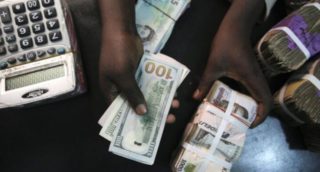
NIGERIA — The Centre for the Promotion of Private Enterprise (CPPE) says the Central Bank of Nigeria (CBN) should reconsider its stance on the termination of forex to the foreign exchange market.
Godwin Emefiele, CBN governor, had said the apex bank will stop the sale of foreign exchange to banks by the end of the year.
In a statement issued on Sunday, Muda Yusuf, CPPE chief executive officer, said there would be consequences if the decision is taken.
“The implication of this is that the CBN will stop its supply of forex to the foreign exchange market,” the statement reads.
“CPPE would like to caution that the apex bank should rigorously think through this proposition before implementation because of the likely systemic shocks, business disruptions, macroeconomic dislocations and weakening of investors confidence.
“A much deeper and robust I &E forex window should be in place before the CBN can contemplate a termination of its forex market interventions.”
Yusuf commended the effort of the apex bank on the RT200 programme as it would go a long way in affecting the economy tremendously if properly managed.
“The reality is that supply-side policies are even more critical and impactful than demand management interventions in the foreign exchange market. Over the last couple of years, the CBN has been fixated on managing the demand side of the foreign exchange market and the outcomes have been suboptimal,” Yusuf said.
He further highlighted the success factors that should be considered by the Bankers Committee, adding that for the initiative to succeed, there is a need to put certain things in place such as fixing structural constraints impeding non-oil exports, reviewing the pricing regime in the I&E window, giving exporters access to export proceeds, expanding the scope of forex supply strategies and allowing forex-generating MDAs to sell at the I&E window.
“Structural variables are not within the purview of the CBN or the Bankers Committee. The fiscal authorities have much bigger roles to play in fixing the structural constraints which have been impeding non-oil exports productivity and competitiveness for decades,” he added.
“Collaboration with fiscal authorities is a critical success factor for the realisation of the RT 200 outcomes. It is impossible to clap with one hand. Complementarity between the fiscal and monetary authorities is therefore imperative for the success of this scheme.
“The current pricing regime in the Importers and Exporters [I &E] window of the foreign exchange market is at variance with the objectives of the RT 200. It will be a major impediment to the achievement of the Race To $200 billion Export Proceeds Vision. Exporters are currently not encouraged to remit export proceeds at the current official rate of N416/$. It is a pricing regime that inherently penalizes exporters and it is a major demotivating factor to investment in the non-oil export sector.
“Therefore, the CBN should take urgent steps to ensure that the exchange rate regime in the I&E window is market reflective. The pricing regime should be flexible and reflect the demand and supply dynamics. This is the biggest incentive that the apex bank can give to the non-oil export sector. It will be more impactful than any rebate that the CBN could be contemplating.
“Exporters in the economy must be allowed unfettered access to their exports proceeds. The current policy regime on export proceeds is stifling, restrictive and repressive. It is inhibiting export initiatives, enterprise and growth.
“Regulations around export proceeds should be immediately relaxed in the spirit of the RT 200. Exporters must be able to sell their proceeds at a mutually agreed exchange rate to either the banks, importers or the BDCs as the case may be. The apex bank should institute a willing buyer-willing seller framework for export proceeds.
“CBN should expand the scope of its new foreign exchange supply strategies and incentives to cover other sources of foreign exchange inflows into the economy. Inflows from these sources should be completely liberalised through a market-driven I&E window. Current regulatory regime for inflows is obstructive and inhibiting.
“Foreign exchange generating MDAs should be encouraged to sell their Forex at the I&E window at a market reflective exchange rate. Some of these agencies include the Nigeria Ports Authority [NPA] and the Nigeria Maritime Administration and Safety Agency [NIMASA].”
By Busola Aro/TheCable




